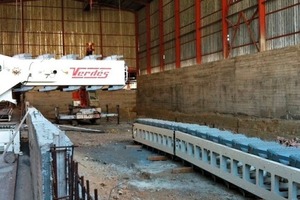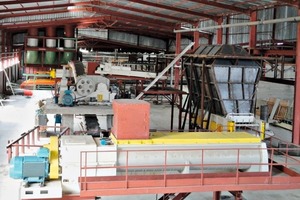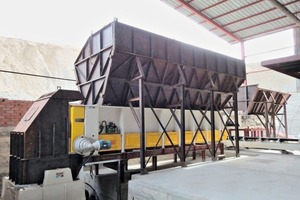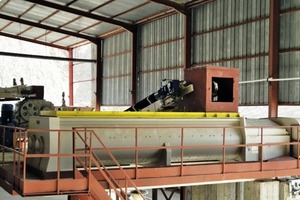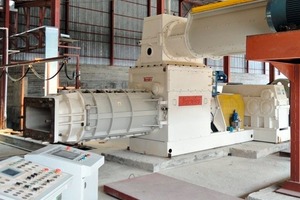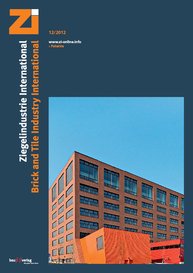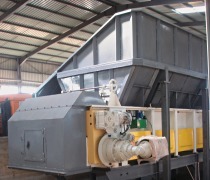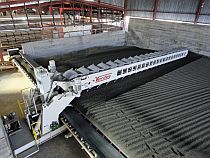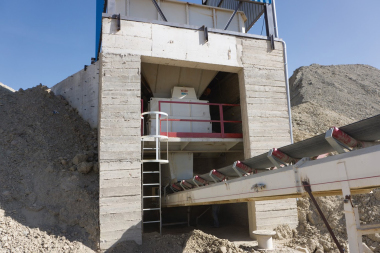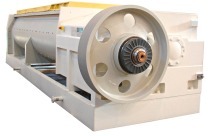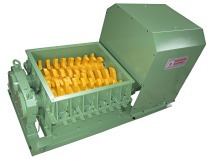Briqueterie Benabdallah Frères starts with a new clay preparation and shaping line from Verdés
For the new plant with a total annual capacity of 560 000 t, Verdés has designed a clay preparation line with equipment sized to allow an hourly production rate of over 180 t.
The overall project is divided into two stages. The first already installed stage of production is equipped with a single production and shaping line to produce 280 000 t/a hollow bricks, although the line has been fitted with equipment and accessories to allow for the manufacture of other ceramic products interesting for the Algerian market. The second stage will comprise the addition of a second shaping line, identical in configuration and capacity to the first.
The Talleres Felipe Verdés scope of supply includes a full set of conveyor belts, electrical panels and automatic control devices which the preparation and manufacture lines will use to maintain a steady level of production in order to ensure complete reliability in terms of green product quantity and quality.
The preparation line is based on two mod 028PS/8 feeder units placed opposite each other which unload individually or simultaneously onto a primary crusher model 118DT with three shafts. This raw material preparation line allows two types of clay to be used, measuring and mixing each of them with precision since the slat table of the two feeders are controlled by frequency converters allowing accurate speed adjustment. Hourly production in this area has been oversized to 250 t/h in order to avoid any chance of bottlenecks in the initial clay preparation area.
The material, which has been reduced at this stage of the process to any size below 80 mm, is delivered to a disintegrator model 128C with adjustable 1 200-mm-wide shells which guarantee the production of grain sizes down to 25 mm. This disintegrator is fitted with a lathe grinder cylinder to ensure that the surface of the cylinder operates under optimum conditions of output and efficiency. The grinding pro-cess and speed is controlled by a frequency converter.
The next unit in the line is a hydraulic hinged roller mill model 092/1200 acting as primary mill which reduces the grain to no more than 3.0 to 3.5 mm. In order to maintain uniformity in spares and interchangeability of components, this roller mill is identical to the unit installed in the shaping area as refining roller although obviously with a lower demand in terms of grinding capacity and output. Just like the disintegrator, it is fitted with two lathe grinders to guarantee the uniformity of the roller mill and size of the material which in turn improves the efficiency of the mixing.
The mixer is a model 046S unit, one of the largest on the market and the second to be installed in Algeria. Other units are installed in South Africa, Mexico, Spain and the USA producing up to 200 t/h. The mixer installed in Briqueterie Frères Benabdallah produces up to 180 t/h. The preparation and manufacture areas in this massive installation can operate completely independently or in different shifts. The future installation of a second production line is possible to mix in double shifts in the clay preparation area.
Once it is properly prepared and mixed, the material is sent to an intermediate souring facility with a capacity of 9 000 m3, the equivalent of 14 days of manufacturing in this first stage of the project. The 67-m-long souring facility contains a 17.1-m-long reclaimer which automatically manages excavation and feeding of the shaping area. The DRAVH 17.1/800 assembly incorporates its own electrical cabinet and automated control of all transfer movements, including the frequency converters to control the speed of the buckets as well as the longitudinal displacement of the jib carriage. The entire storage reclaimer is set in motion via a filling control system which detects the requirements in the shaping and manufacturing area. A box feeder model 028P regulates the feed to the refining roller mill. This is a hydraulic hinged roller mill again processing the material to 1.2 mm although it is designed to enable final comminution down to 0.8 mm.
Finally, the de-airing extruder is a Combi model 077S with 750-mm augers allowing cylindrical and/or conical configuration depending on the condition of the clay, its humidity, working pressure and the plasticity of the raw material. Here a classical Verdés configuration has been chosen based on a conical head auger (700 mm Ø) allowing for extrusion work pressure up to and above 25 bar and, therefore, a lower level of moisture which aids drying and minimizes the energy consumption needed to evaporate shaping water. The Combi 077S de-airing extruder retains all the advantages of previous models while continuing to offer high-quality wear-resistant materials, as well as chrome alloy castings and several important new features such as:

